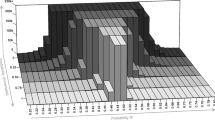Introduction
Motivation. Human beings do not live in isolation and they have to take many decisions collectively. Examples include the election of firm representatives, the decision of where to build a new school, and the task of how to share natural resources. Equally, the satisfaction of a single individual usually depends on the performance of the group; just think of the problem of shirking in team production. To obtain a good collective performance and, as a consequence, a high individual satisfaction, it is important that collective decisions are taken with consensus. This is because in many instances, it is not beneficial for the society as a whole if the decision is imposed by a subset of the individuals—even if this subset includes more than half of the collective— as there may be other alternatives that are more accepted by the rest of the members and that increase the overall satisfaction.
Access this chapter
Tax calculation will be finalised at checkout
Purchases are for personal use only
Preview
Unable to display preview. Download preview PDF.
Similar content being viewed by others
References
Alcalde Unzu, J., Vorsatz, M.: The measurement of consensus: an axiomatic analysis. FEDEA Working Paper 28 (2008)
Alcalde–Unzu, J., Vorsatz, M.: Do we agree? measuring the cohesiveness of preferences. FEDEA Working Paper 23 (2010)
Alesina, A., Rodrik, D.: Distributive politics and economic growth. Quart. J. Econ. 109, 465–490 (1994)
Atkinson, A.: On the measurement of inequality. J. Econ. Theory 2, 244–263 (1970)
Arrow, K.: Social choice and individual values, 2nd edn. John Wiley, New York (1963)
Baldiga, K., Green, J.: Choice-based measures of conflict in preferences. Harvard University (2009)
Bosch, R.: Characterizations of voting rules and consensus measures. Ph. D. Dissertation, Tilburg University, The Netherlands (2006)
Borda, J.:Mémoire sur les élections au scrutin. Histoire de l’Academie Royale des Sciences, Paris (1781)
Condorcet, M.: An essay on the application of probability decision making: An election between three candidates. In: Sommerlad, F., McLean, I. (eds.) The political theory of Condorcet, University of Oxford, Oxford (1989)
Cook, W., Seiford, L.: Priority ranking and consensus formation. Management Sci. 24, 1721–1732 (1978)
Cook, W., Seiford, L.: On the Borda–Kendall consensus method for priority ranking problems. Management Sci. 28, 621–637 (1982)
Cowell, F.: Measuring inequality. In: LSE Perspectives in Economic Analysis. Oxford University Press, Oxford (2008)
Duclos, J., Esteban, J., Ray, D.: Polarization: concepts, measurement, estimation. Econometrica 74, 1737–1772 (2006)
Eisenberg, J.: Group cohesiveness. In: Baumeister, F., Vohs, K. (eds.) Encyclopedia of social psychology, Thousands Oaks, Sage (2007)
Esteban, J., Ray, D.: On the measurement of polarization. Econometrica 62, 819–852 (1994)
Gini, C.: Measurement of inequality and incomes. Econ. J. 31, 124–126 (1921)
Hays, W.: A note on average tau as a measure of concordance. J. Amer. Stat. Ass. 55, 331–341 (1960)
Hutchens, R.: One measure of segregation. Inter. Econ. Rev. 45, 555–578 (2004)
Kendall, M.: Rank correlation methods, 3rd edn. Hafner Publishing Company, New York (1962)
Kemeny, J.: Mathematics without numbers. Daedalus 88, 577–591 (1959)
Klamler, C.: A distance measure for choice functions. Soc. Choice Welfare 30, 419–425 (2008)
Kranich, L.: Equitable opportunities: an axiomatic approach. J. Econ. Theory 71, 131–147 (1996)
Montalvo, D., Reynal–Querol, M.: Ethnic polarization, political conflict, and civil war. Amer. Econ. Rev. 95, 796–816 (2005)
Persson, P., Tabellini, G.: Is inequality harmful for growth? Amer. Econ. Rev. 90, 869–887 (1994)
Roemer, J.: Equality of opportunity. Harvard University Press, Boston (1998)
Author information
Authors and Affiliations
Editor information
Editors and Affiliations
Rights and permissions
Copyright information
© 2011 Springer-Verlag Berlin Heidelberg
About this chapter
Cite this chapter
Alcalde–Unzu, J., Vorsatz, M. (2011). Measuring Consensus: Concepts, Comparisons, and Properties. In: Herrera-Viedma, E., García-Lapresta, J.L., Kacprzyk, J., Fedrizzi, M., Nurmi, H., Zadrożny, S. (eds) Consensual Processes. Studies in Fuzziness and Soft Computing, vol 267. Springer, Berlin, Heidelberg. https://doi.org/10.1007/978-3-642-20533-0_12
Download citation
DOI: https://doi.org/10.1007/978-3-642-20533-0_12
Publisher Name: Springer, Berlin, Heidelberg
Print ISBN: 978-3-642-20532-3
Online ISBN: 978-3-642-20533-0
eBook Packages: EngineeringEngineering (R0)




